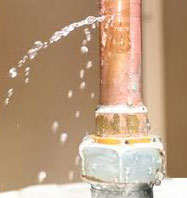 Asking what it costs to fix leaks is pretty ambiguous unless you know where your basement water is leaking from. This can be difficult, unless the leak is obvious, because water travels. But like it or not, the cost is defined by the cause so until you are able to determine the source of your leak, you’re working with an open checkbook.
Asking what it costs to fix leaks is pretty ambiguous unless you know where your basement water is leaking from. This can be difficult, unless the leak is obvious, because water travels. But like it or not, the cost is defined by the cause so until you are able to determine the source of your leak, you’re working with an open checkbook.
If you have to hire a qualified contractor to find the leak for you, it can get quite expensive. Calling a plumber may not even be the right trade or the only trade to handle your leak. When a leak has gone untreated for a period of time, there may also be residual damage that needs repair in addition to the leak itself compounding your costs.
There are steps you can take to save contractor cost by determining where your basement water is leaking from yourself. The source of your water leaks can be pretty easy to locate. When you have found the likely source (through process of elimination), then you are better equipped to decide whether the repair is something you want to do or need to have a qualified contractor(s) handle.
To get you started, here is a list of several possible reasons you have basement water leaks. This checklist will help you narrow down where your water may be leaking from so you can take the necessary next steps to fix leaks yourself or begin the process to hire a contractor.
Basement Water Leaking From Poor Foundation Drainage?
Regardless of the type of waterproofing you may have in your home, if the water around your home’s foundation cannot effectively drain away you will have leaks. The pressure standing water exerts will eventually travel to a weak spot in your foundation and seep into your basement.
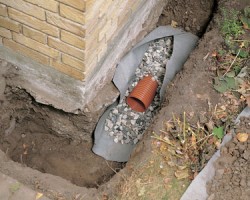 Do you notice standing water anywhere around your foundation after it rains or after you water plants or shrubs next to your home? If you do, then the grade around your home’s foundation isn’t sufficiently sloped for water to run away from the home.
Do you notice standing water anywhere around your foundation after it rains or after you water plants or shrubs next to your home? If you do, then the grade around your home’s foundation isn’t sufficiently sloped for water to run away from the home.
Do you have gutters and downspouts on your home? Unless your gutters are clear and you have splash blocks or some other form of drainage to carry the water from your downspouts beyond your home’s foundation, you will continue to have problems. Adding waterproofing to your basement’s interior to fix leaks is the band-aid approach until you address the root cause of where water is leaking from.
If you know you have drain tile around the perimeter of your foundation, this may be another source for water leaking. Exterior drain tile maintenance should be done every few years depending on your geographic region and climate and is often overlooked as part of a home maintenance regimen. Exterior drain tile can fill with sediment and rocks that can hamper effective drainage and cause the drainage system to fail.
Sump Pumps the Source of Leaking Water?
If you have a sump pump you already know it’s a form of basement waterproofing to keep water out of basements in low lying areas or those with high water tables. Basement water leaking from your sump pit and a drain line not properly maintained can be a source. Dirt, gravel, sand and debris can collect in the pit and the drain causing a backup of water. Any sump pit should have a battery-operated sump pump alarm installed several inches below the cover to alert any homeowner of potential backup, however, regular maintenance can prevent any future seepage.
Damp and Smelly Crawl Space?
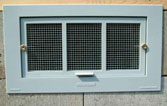 Is basement water leaking from a wet crawl space. Nothing smells worse than a musty odor from a damp crawl space. Older homes without properly treated crawl spaces are exposed to effects of damp basement, black mold, wood rot, rodents, structural floor fatigue and other very costly issues.
Is basement water leaking from a wet crawl space. Nothing smells worse than a musty odor from a damp crawl space. Older homes without properly treated crawl spaces are exposed to effects of damp basement, black mold, wood rot, rodents, structural floor fatigue and other very costly issues.
This is something that can easily be remedied by adding a vapor barrier over the crawl space floor, installing or updating crawl space vents for air circulation, adding crawl space doors, sump pumps, or dehumidifiers as your specific condition requires.
Is Water Pipe Corrosion a Leak Contributor?
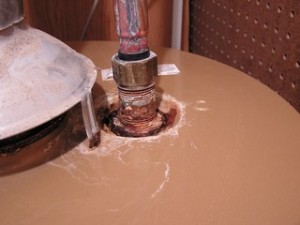 Pipe corrosion is another option when determining where basement water is leaking from. Over time, the gasketing in pipe joints will shrink or fail due to corrosion or the pipe connections themselves may start to corrode.
Pipe corrosion is another option when determining where basement water is leaking from. Over time, the gasketing in pipe joints will shrink or fail due to corrosion or the pipe connections themselves may start to corrode.
The joint or connection of two incompatible materials can cause a chemical reaction corroding those materials where they come in contact with each other. How hard your water is, the amount of minerals in the water, water pressure, temperature and pH level may all contribute to rusting pipes and leaks.
Copper piping can become pitted internally from corrosion causing pin hole leaks in the piping as shown at the top of this post. This can be spotted by noticing blue-green discoloration patches on the outside of the piping. Be sure to check the water piping connections to your water heater as this is often a source of corrosion and dissimilar material reactions.
In the instances of corrosion, the offending sections of piping need to be replaced. If the corrosion is a result of dissimilar materials creating a chemical corrosive reaction, you can fix leaks by using a neutral connector like heavy gauge plastic between the two materials so it prevents them from touching each other and creating future corrosion.
Broken Under Slab Piping Leaks You Can Find
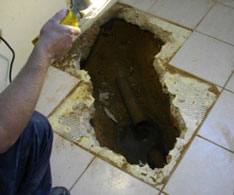 There are many ways to determine if you have basement water leaking from under your slab — using a stethoscope or listening through an inverted glass are two of the wackier ones.
There are many ways to determine if you have basement water leaking from under your slab — using a stethoscope or listening through an inverted glass are two of the wackier ones.
One of the easiest ways is to check your water meter. If you have all appliances and outside irrigation turned off and are not flushing any toilets or turning on any faucets and your water metering is still running, you know you have a leak somewhere.
The simplest way to check your basement slab is to walk on it without your shoes. If you find a warm or hot spot on the concrete floor, then chances are good that you have a leak under your slab in that location. At that point, you’ll need a plumber and this repair won’t be cheap.
The plumber will use an electronic leak detector to pinpoint the exact location and then they’ll need to cut out the concrete, make the repair and then pour back the concrete. If you have reinforcing steel in your slab, then cutting through the reinforcing steel may compromise the structural integrity of your slab depending on the size of the hole. Be sure to discuss this with your plumber.
Fix Leaks in Basement Windows and Window Wells?
Over time, and unless maintained, any sealants and caulking exposed to the elements will shrink and crack. Basement water leaking from pinhole-sized openings in shrinking or cracked sealants is common. This is a typical source of water infiltration into a basement and one of the more easily fixable leaks that can be accomplished by the homeowner without having to hire a contractor – probably one of the least expensive sources of leak repair.
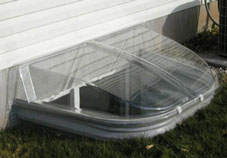 Homeowners with basement window wells are saddled with these collectors of leaves, dirt and garbage not to mention rain water and snow.
Homeowners with basement window wells are saddled with these collectors of leaves, dirt and garbage not to mention rain water and snow.
They rust and corrode if not properly maintained leaving a homeowner looking for way to fix the leaks they will inevitably generate. The simple fix for window wells is to cover them with a durable clear plastic window well cover.
Not only will they keep the natural light coming through your basement windows but will provide an energy savings through their insulating value during those cold winter months.
Basement windows are a different story. Two options for repair are replacing cracked caulking and sealants with time and weather tested sealants. Be sure they are compatible with the material you plan to use them on. The other option for repair is to add a drip cap or edge to the top and bottom of the windows that will redirect water away from the windows and into your perimeter drainage system.
Condensation Resulting From High Interior Humidity
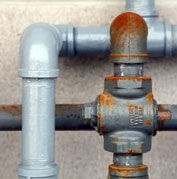 Have you noticed a white powdery substance on your basement walls or floor? This is known as efflorescence and is the result of moisture permeating through your concrete slab or foundation walls. This adds to the relative humidity of your home and heating and cooling humid air costs more to dry it out.
Have you noticed a white powdery substance on your basement walls or floor? This is known as efflorescence and is the result of moisture permeating through your concrete slab or foundation walls. This adds to the relative humidity of your home and heating and cooling humid air costs more to dry it out.
If you have high humidity in your home it will show itself in the form of condensation in the coldest areas of a wall, window or on piping. As water droplets form and collect, so does pipe corrosion, rust, wood rot and mold. Left untreated for any length of time can become a health hazard for you and your family.
Many people will had a humidifier to the home to combat dry air, particularly when running a furnace or heat pump in colder months. This added humidity, to that already in the home generated by showers, cooking, cleaning, etc., only compounds a condensation issue. An option to consider here would be the addition of a humidifier with an outdoor sensor that will automatically adjust the call for humidity based on outside temperatures and indoor conditions.
Many Basement Leaks Can Be DIY Repairs
 There’s no question that your basement water leaking from any number of locations or conditions in your home can be a headache but if you’re lucky you won’t have to deal with more than one.
There’s no question that your basement water leaking from any number of locations or conditions in your home can be a headache but if you’re lucky you won’t have to deal with more than one.
Even a single source though, if left untreated, can lead to mold, mildew, musty odors and biological growths detrimental to your health. It can also decrease the value of your home, cause expensive structural damage, premature paint failure and lead to wood rot.
It’s important and more cost effective for you up front to do the walk and determine where your water is leaking from. You may find the source through the process of elimination and realize you can fix leaks yourself without having to hire a contractor.
If you do need to hire a contractor, the effort you put in up front locating the source of your water will be money that stays in your pocket to offset a costly repair.
Tagged with: cost to fix leaking basement • cost to fix water leaks • how much does it cost to fix basement water leaks
Filed under: Defects





